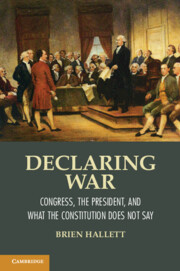Book contents
- Frontmatter
- Contents
- List of Figures
- Acknowledgments
- Prologue
- Miscellaneous Frontmatter
- 1 A Constitutional Tyranny and Presidential Dictatorship
- Part I What Is the History?
- Part II What Is a Declaration of War?
- Part III What Are the Solutions?
- 8 A Constitutional Amendment
- 9 A Congressional Work-Around
- Part IV What Is the Theory?
- Appendix I Five Congressional Declarations of War and One Appropriations Act
- Appendix II The Fœderative Powers in Parliamentary Governments
- References
- Index
8 - A Constitutional Amendment
Published online by Cambridge University Press: 05 November 2012
- Frontmatter
- Contents
- List of Figures
- Acknowledgments
- Prologue
- Miscellaneous Frontmatter
- 1 A Constitutional Tyranny and Presidential Dictatorship
- Part I What Is the History?
- Part II What Is a Declaration of War?
- Part III What Are the Solutions?
- 8 A Constitutional Amendment
- 9 A Congressional Work-Around
- Part IV What Is the Theory?
- Appendix I Five Congressional Declarations of War and One Appropriations Act
- Appendix II The Fœderative Powers in Parliamentary Governments
- References
- Index
Summary
The Congress shall have power … to declare war, grant letters of marque and reprisal, and make rules concerning captures on land and water;. …
(article I, section 8, clause 11)The Congress, whenever two-thirds of both houses shall deem it necessary, shall propose amendments to this constitution, or, on the application of the legislatures of two-thirds of the several states, shall call a convention for proposing amendments, which, in either case, shall be valid to all intents and purposes, as part of this constitution, when ratified by the legislatures of three-fourths of the several states, or by conventions in three-fourths thereof, as the one or the other mode of ratification may be proposed by the Congress.
(article V)Stated baldly, the Congress has not, cannot, and never will declare war in any meaningful or appropriate manner. It is organizationally, morally, and politically incapable of even dreaming of discharging its constitutional responsibilities in this area. A superficial diagnosis would identify the source of this failure not as a fundamental constitutional flaw, but as lack of congressional initiative in the face of an “imperial presidency.” This shallow view leads to the suggestion that the Congress could regain the initiative if only it could regain control over the drafting of the declaration and, hence, control over the question of war or peace. In the next chapter, I take up this suggestion, outlining a way for the Congress to regain the initiative to draft its own declarations, and, hence, to decide the question of war or peace independently of the president. Yet, it must be said, this suggestion is basically a work-around, a way of patching up a fundamental flaw in the Constitution. For political reasons, the work-around may be easier to implement than a constitutional amendment, and a patch is better than nothing, but, to be frank, fundamental flaws require fundamental solutions.
A more penetrating diagnosis, however, would acknowledge that the Federal Convention stacked the deck against the Congress when it failed to assign the power to decide the question of war or peace most explicitly and unambiguously to them. Then, fatally, an increase in size and workload forced the Congress to invent the modern standing-committee system. As a result, the Congress is simply not organized “to declare war.” Following up on that last thought, it is perhaps useful to go back to the beginning and work one’s way slowly to a truly constitutional solution.
- Type
- Chapter
- Information
- Declaring WarCongress, the President, and What the Constitution Does Not Say, pp. 163 - 182Publisher: Cambridge University PressPrint publication year: 2012



